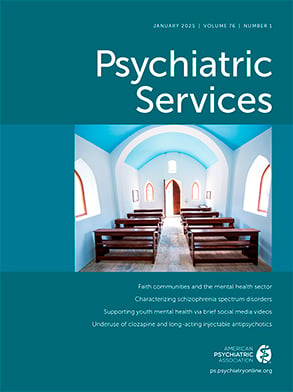Where is the appropriate place in the service system for consumers? A new report provides an emphatic answer: “Consumers of mental health services must stand at the center of the system of care and the system needs to develop ways for them to design, administer, provide, and monitor their services and supports.” The report and its recommendations for strengthening consumer involvement reflect the main theme of the 2003 report of the President's New Freedom Commission: nothing short of transformation is needed to create a consumer-centered system.
The 73-page report, Consumer Involvement With State Mental Health Authorities, is a joint effort of the National Association of Consumer/Survivor Mental Health Administrators (NAC/SMHA) and the National Association of State Mental Health Program Directors (NASMHPD) Medical Directors Council, with funding from the Substance Abuse and Mental Health Services Administration (SAMHSA). Placing its roots firmly in the consumer movement, the report begins with a history of the movement, describing key phases of its evolution in each decade since the 1970s—from a focus on civil rights and social justice in the early years to more recent emphases on wellness, recovery, and social inclusion. The authors acknowledge that the divergent motives, philosophies, and goals of consumers and state mental health authorities (SMHAs)—along with long-standing power differentials—have often been key sources of tension, but they also note, “In exploring opportunities for consumer involvement it is important to look for areas where overlap of goals exist and let each group (consumers and SMHAs) go their separate ways in those areas of discordance.”
The second section of the report reviews recent empirical studies showing that consumer-provided services are as effective as or more effective than standard services of a similar type. These services take many forms: self-help and mutual support groups, peer-to-peer services, peer-to-peer education, recovery and wellness self-management, person-centered planning, peer addiction recovery services, and employment of peer specialists in traditional programs, such as assertive community treatment, and in evidence-based peer services, such as supported socialization, consumer advocacy, and broad-based case management.
Several specific roles and titles have emerged for consumers: peer support specialist, peer mentor or counselor, recovery support specialist, recovery aide, client liaison or “de-briefer,” and peer bridger. Career ladders for individuals in these positions are expanding, particularly since 2007 when the Centers for Medicare and Medicaid Services designated peer support services as billable. Consumers also serve in numerous capacities in consumer-run organizations, research design and evaluation, state Offices of Consumer Affairs, statewide consumer networks, strategic planning groups, advisory councils, hospital committees, public education campaigns, and law enforcement training, to name a few.
The primary goal of the report is to recommend ways to expand these roles and to begin to fill in a critical gap noted in the development of the report: ”There continues to be a lack of national guidelines on consumer involvement in policy making and oversight of the delivery of the provision of public mental health services. . . . There has been little or no systemic activity in the areas of developing formal mechanisms to incentivize the hiring of consumers in recovery; allowing for consumer involvement in regulatory functions, such as certification and licensing; and creating metrics to measure consumer involvement and its impact on outcomes.”
Two strategies recommended for overcoming barriers to consumer involvement are education and training for consumers and guidance for state agencies in developing job descriptions and hiring procedures, especially because many administrators fear that creation of peer support positions might violate antidiscrimination laws. Ideally, as much of the consumer training as possible should be via college courses so that consumers can accumulate credits for future positions outside the mental health system at the same time that they are acquiring skills to work within it. Many training and mentoring opportunities also exist within service agencies, and federal vocational rehabilitation and Ticket-to-Work funding can be used to support peer-provided services.
The report ends with eight pages of bulleted lists of recommendations directed at key stakeholders: SMHAs, state-level consumer organizations, and provider organizations. Recommendations cover three main areas: leadership, administration and management, and policy and funding. For example, in the area of leadership, “All SMHAs should have a full-time, state-employed consumer leading their Office of Consumer Affairs and that position should be on an executive level.” “States that do not have consumer organizations should fund a statewide organizing effort and seek the support from other states that are further along.” In this area, state consumer organizations are advised to “partner with civil rights organizations to address issues and include people who have criminal justice involvement.” In the policy and funding area, all SMHAs should fund consumer-operated services, using a meaningful portion of the block grant. Consumer organizations are also advised to set up a “big tent” to ensure that the voices of all consumers are heard, including people with co-occurring substance, developmental, communicative, and medical disorders; consumers in the active-duty military and veterans; youths, transition-age youths, and older adults; and various ethnic, sexual-orientation, and cultural minority groups. A 48-page appendix with separate tools for consumers, local communities, and SMHAs to assess levels of consumer involvement is also available.
The report is based on a review of materials and extensive discussions at a meeting of the report team held June 21–22, 2010. The 19 team participants included SMHA medical directors and commissioners; leaders from SAMHSA; expert faculty from the Appalachian Consulting Group, the National Association of County Behavioral Health and Developmental Disability Directors, the Los Angeles Department of Mental Health, and the University of Illinois at Chicago; consumer representatives from a statewide peer wellness initiative, the National Alliance for Mental Illness, the National Empowerment Center, the Mental Health Association of Southeastern Pennsylvania, the Federation of Families for Children's Mental Health; and other technical experts. The report is available on the NASMHPD Web site at
www.nasmhpd.org.

